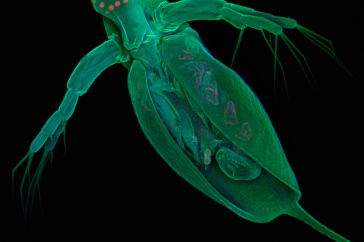UNH Report: N.H. Energy Efficiency Program Will Save State $60M

Daphnia pulex (commonly called waterflea)
Credit: Dr. Jan Michels (Christian-Albrechts-Universität zu Kiel), michels@zoologie.uni-kiel.de
DURHAM, N.H. - A report issued today by the University of New Hampshire's Carbon Solutions New England (CSNE) provides first-year results from the state's Greenhouse Gas Emissions Reduction Fund (GHGERF) showing grants awarded by the fund generated an actual, verified energy use reduction of 40,500 BTUs and a savings of $1.5 million to state businesses, communities, and residents in the first year of the program. The lifetime savings from the $17.7 million awarded from the fund are projected to be $60.6 million in energy costs based on current energy prices.
The report, which covers the period from July 2009 through June 2010, also shows carbon dioxide emissions were reduced by 4,600 metric tons. Projected out over the lifetime of the program, carbon dioxide emission reductions of 200,000 metric tons or the equivalent of taking 38,500 cars off the road for one year would be achieved. For every dollar invested by GHGERF there will be a return of $3.42 in energy savings over the lifetime of the projects.
"The GHGERF program has invested in a wide range of projects essential for enhancing energy efficiency and providing the foundation for the state to implement key recommendations of the New Hampshire Climate Action Plan," says CSNE director Cameron Wake, a co-author of the report and research associate professor at the UNH Institute for the Study of Earth, Oceans, and Space.
The GHGERF was created by state legislation in 2008 and derives its funding from New Hampshire's participation in the Regional Greenhouse Gas Initiative or RGGI - a regional cap-and-trade program that specifically targets carbon dioxide emissions from fossil‐fuel electric power generation. RGGI, which has 10 participating states from the Northeast and Mid-Atlantic, creates a market for carbon dioxide emissions, and New Hampshire emissions allowances are sold at quarterly auctions. Proceeds paid into the GHGERF are administered by the N.H. Public Utilities Commission (PUC).
In 2009, the PUC competitively awarded 30 grants for a total of $17.7 million to support programs and projects that directly and indirectly supported the reduction of fossil fuel-based energy. The grants went to an array of public, private, and non-profit entities and program types and served a wide range of energy consumers, many whom are not covered by traditional utility-operated energy efficiency programs. Approximately 80 percent of the funds went to activities that directly reduce energy use.
Carbon Solutions New England is a public-private partnership based at UNH and works to promote collective action to achieve a clean, secure energy future while sustaining the region's unique natural and cultural resources. To view the full report, visit http://www.puc.nh.gov/Sustainable%20Energy/GHGERF.htm
and scroll down to the links under "Greenhouse Gas Emissions Reduction Fund - Year 1 Evaluation (July 2009 - June 2010)."
The University of New Hampshire, founded in 1866, is a world-class public research university with the feel of a New England liberal arts college. A land, sea, and space-grant university, UNH is the state's flagship public institution, enrolling 12,200 undergraduate and 2,300 graduate students.
-30-
Editors and reporters: Cameron Wake can be reached at (603) 862-2329 and cameron.wake@unh.edu
-
Media Contact
NH Forum on the Future | NH Forum on the Future | fredk7@myfairpoint.net | 603-498-5221
Latest News
-
January 12, 2026
-
December 4, 2025
-
November 26, 2025
-
November 6, 2025
-
November 5, 2025













































